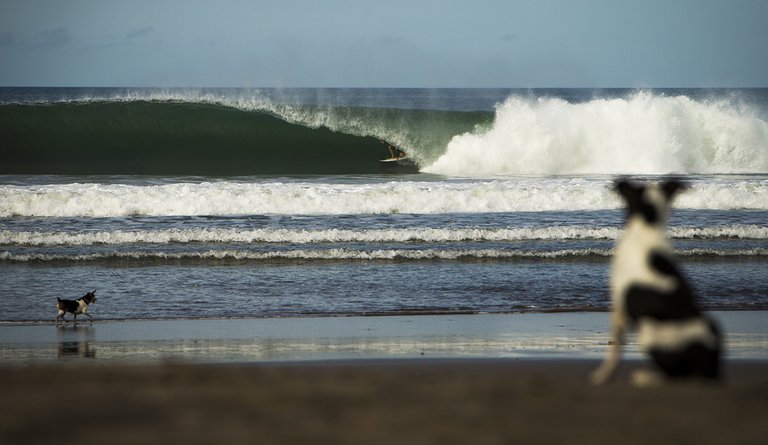Here is a recent interview from us at The Surf Ranch and The Intertia about the situation in Nicaragua.

For the last several months, Nicaragua’s been in a protracted state of civil strife. The situation is complex. But, in short President Daniel Ortega announced widely unpopular social security reforms in April, spurring public protests and demonstrations. The reforms have since been canceled, but opposition to the president calling for his ouster has grown, leading to violent clashes with officials and continued unrest. Since the protests began, more than 300 have died leading the Washington Post to label Nicaragua the next Venezuela.
According to many hotel operators that cater mainly to surf clientele, business is way down. “I have had to talk clients off the cliff from canceling,” explained Dave Hall, co-founder of AST adventures, which operates La Barra Surf Resort in Puerto Sandino in the northwest of the country.
In a post on La Barra Surf Resort’s Facebook page, Hall explained that yes what’s going on in Nicaragua is serious, but violence is mainly centered in Managua and areas like Masaya and Nagarote. “The beaches are safe, no protesting, and best of all the lineups are very very empty,” reads the post.
When the U.S. State Department comes out with travel warnings that encourage would-be travelers to reconsider vacation plans due to “crime, civil unrest, and limited healthcare availability,” it’s no wonder people are afraid.
“Heavily armed, government-controlled parapolice forces in civilian clothing, sometimes numbering in the hundreds, operate in large parts of the country, including Managua,” explains the State Department’s travel advisory for Nicaragua. “They are often in vehicles that don’t have license plates, and they may be escorted by uniformed police forces. These groups are attacking blockades, kidnapping and detaining individuals, taking over privately owned land, and committing other crimes.”
Tour operators are emphatic that along much of the coast where surfers frequent, you’d never notice. Still, the country’s burgeoning tourism industry, that accounted for $450 million in revenue in 2015, is being heavily impacted by media coverage of violent protests and unrest.
“The Emerald Coast of Nicaragua, from San Juan Del Sur up to Popoyo, has been untouched by the civil unrest in Managua, in the sense of riots and violence, however it has been affected by a major decrease in tourism, with many hotels now running at 10% or less occupancy, with most of them at 0% occupancy, resulting in the temporary closure of small hotels to large resorts,” explained Lucas Boychuk, director of operations at Surf Ranch Hotels & Resorts in San Juan del Sur. “The only clientele in these areas now, seem to be Nicaraguans and families from the capital city of Managua looking for a weekend escape, local expats who never left, and surfers looking to have the line up all to themselves.”
Carl Segerstrale, co-founder of NSR, echoed that sentiment. “Generally speaking, it’s been 100% safe out here at the beaches where we live (Tola, Popoyo, Playa Colorado). We have not experienced any protesting or violence or anything out of the ordinary. It’s rural here, so that’s a big reason why we’ve remained off the map,” he said.
“We have been affected however, by the roadblocks and the difficulty getting here from Managua and the airport,” explained Segerstrale. “At one point, early on, much of the country had roadblocks and the highways were gridlocked. It was tough getting to [the airport] but our drivers were always able to find alternate routes, sometimes even driving through riverbeds and farmland. During this time, there was a two week period when the supermarkets and gas stations in our area also ran low on supplies and fuel. For us, that was the most stressful time because without provisions life becomes impossible. It didn’t last long though and the government removed the roadblocks and opened the roadways again about a month ago and transportation has been running mostly normal since then.”
Of course, the coast may be mostly safe, but getting there often requires first flying into Managua then being transported by car. With roadblocks and barricades set up by protesters, the fear is navigating the city could turn dangerous quickly. Tour operators like Hall, though, are adamant that the drivers they employ know their way to and fro and have transported many clients since the protests began without issue.
“It’s simple, we transfer [guests] from 5 am to 3 pm avoiding any conflicts. Our major route is the Pan American, which is safe, and the route outside the city of Managua is untouched so guests only have to get out of the city which is a 20-minute ordeal,” he explained. “What people don’t know is all roadblocks have been eliminated as of last week so all roads are clear but the unrest continues specifically around Masaya about 1 hour south of Managua,” he added via email.
In the case that travelers are headed to areas like San Juan Del Sur in the south, it’s possible to avoid flying into Managua entirely.
“[A] popular option is to fly into Liberia, Costa Rica, as they have direct flights from Canada, Europe & the US,” Boychuk explained to me. “Then, have a shuttle drive you from Liberia up to San Juan Del Sur or anywhere in Nicaragua, without having to switch vehicles at the border.”
It’s especially prudent to stay informed on the latest happenings if you do plan to travel to Nicaragua in the near future. Not to mention, reach out to hotels or tours to get the situation on the ground.
For operators like Hall, perception is powerful and can have a serious impact on the livelihoods of his employees, which is precisely why he wants clients to have an accurate picture of what’s going on. “We are not just going to sit here and let this shit leave our amazing employees without work,” he said.